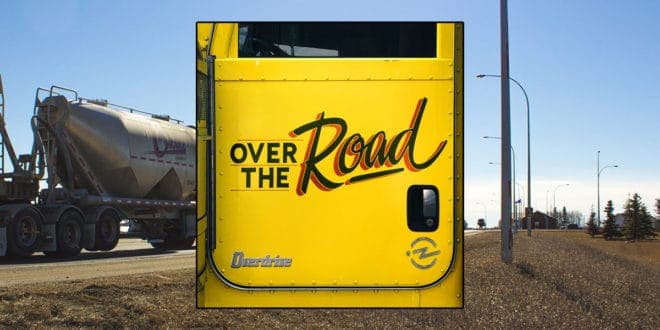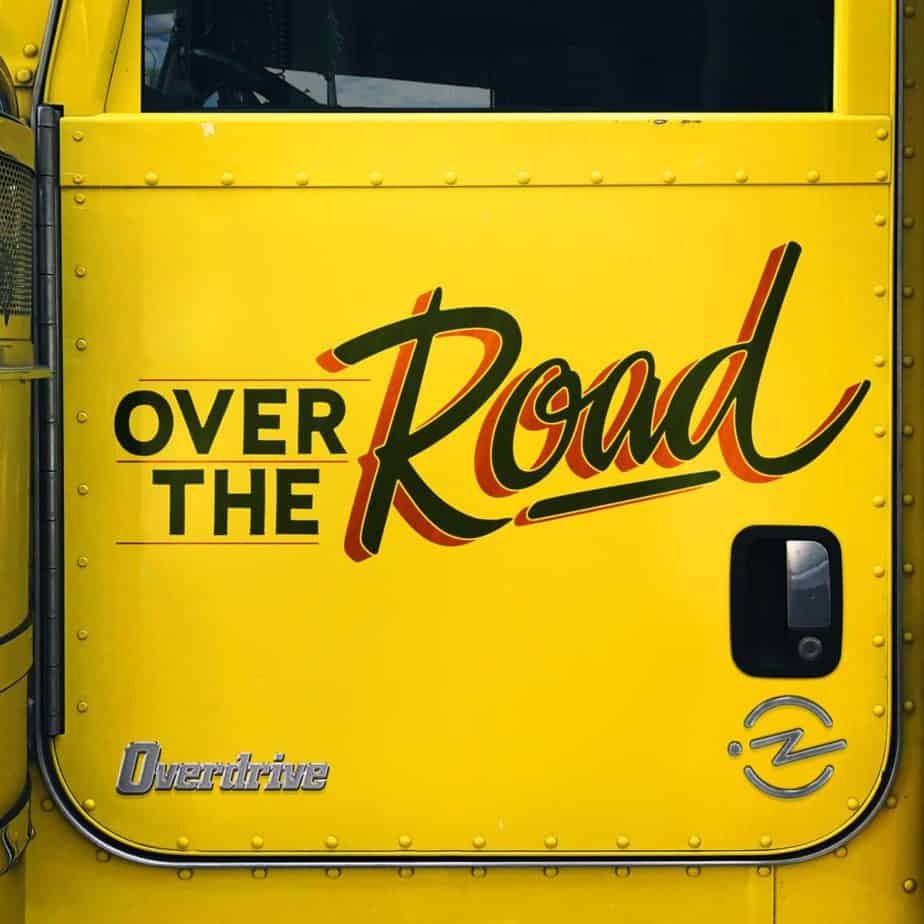Over the Road starts fun, but with rough idle


Over the Road is a rare moment in podcasting where a topic I’ve been dying to see covered in a thoughtful way gets produced by Radiotopia, one of the few podcast networks I adore without caveat. An eight part series about truckers, made by a trucker, and made in partnership with a trucking industry magazine.
Every hack reporter and politician in the country has trotted out the phrase “truckers are the backbone of the American economy.” As trite as the comment is, it’s true. They’re the reason companies like Dollar General can pop up in towns with a lower population than the enrollment at my college. They’re why grocery stores have year-round produce selection regardless of harvest season. Whether it’s long-haul or last-mile delivery, the US relies on big rig drivers. Yet oftentimes people’s platonic ideal of A Trucker lies somewhere on the pop culture stereotype spectrum between hee-haw Smokey and the Bandit cowboys and antisocial horror movie monsters a’la Joy Ride.
Host “Long Haul Paul” Marhoefer has been a trucker for most of his life, a contributor to Overdrive magazine, a singer/songwriter (three guesses as to what his songs are about). Throughout eight episodes he interviews a wide cast of characters to talk about modern issues truckers face, as well as giving outsiders a glimpse into the community of people cruising big rigs across the country ten hours a day.
I don’t have a CDL myself, but one of my day jobs has me out in trucker territory driving a 30 foot van down the same 500 mile stretch of interstate in the middle of the night. It’s a light day trip in comparison to what long-haul truckers put on the odometer every day, but it does mean I spend a fair bit of aggregate time at truck stops, forever awash in the rumble of idling big rigs parked up for the night. I was ready to slide into the world of Over the Road like a warm bath, basking in salt-of-the-earth characters and interrogation of a community founded around an inherently isolating and stressful job.
Unfortunately, there’s not much salt and a bit too much butter on this pilot episode for my liking. From the opening seconds Over the Road is a challenging listen for anyone expecting run-of-the-mill nonfiction podcast narration. Seemingly in an attempt to feed into the ethos of his “Long Haul Paul” moniker, Marhoefer affects a well-packed dirt road of a voice. He takes one full stride over the line between an on-mic sound into gravely audiobook narrator territory. That feeling is compounded with a hefty dusting of creative writing flair in the script for the episode’s cold open.
The first few minutes are dedicated to a story from 2016 when his trailer was rear-ended while carrying a load of miniature Guatemalan watermelons. Gentle sound design and subtle music cues drift in and out of Marhoefer’s narration to signal this show has Good Editing. When Long Haul Paul investigates the damage and the script makes its first cheesy flex of the show:
“What was once a perfectly-picked personal watermelon was now prolapsing through its ruptured rind, down the crumpled exterior of what had once been the trailer’s stainless-steel door and onto my trembling hand.”
Between his Narrator Voice and the punched-up script I genuinely would’ve taken a moment to notice if he’d transitioned from talking about trucking into talking about The Gunslinger’s quest to reach the Dark Tower. Whenever the episode cuts interviews he recorded at the Mid-America Trucking Show we get glimpses of real-world Paul. He’s higher-energy, affable, and an accent allowed to come out and play. He sounds excited to be recording something, only for his smoothed-out persona to swoop back in with another witty quip. Perhaps “the host’s voice and how it’s mastered sounds like an audiobook” is a granular thing to spotlight, but I know there are a fair few people in podcasting who will bounce right off a podcast simply because something has Big Cheesy Audiobook Energy.
Cheese is not an inherently bad thing. Cheesy content can be fun, and in the world of trucking where “trucker culture” can get absolutely goofy it’s not a bad angle of attack. There’s only so many times one can say some of the more wacky or painfully literal trucker slang terms with a straight face. It pays off to work a fair amount of comic relief into a lot of stories. Given the central topic of the episode centers around frustrations, I can see why a lighthearted almost mythologized version of Marhoefer is used.
The central conflict of this episode (also teased to be a recurring issue throughout the series) is that between truckers and their infamous elogs: government mandated electronic logging devices hardwired to their trucks. Where truckers used to keep a physical logbook (which allowed a certain amount of freedom to fudge how many hours they’d worked), now a tiny computer runs the show. From the second a rig is started at the beginning of a work day, drivers have an unstoppable clock ticking down. If by the end of allotted work time the truck isn’t parked… something happens.
Much hand-wringing is spent on anxiety about elogs “erasing trucker culture,” forgoing actually defining said culture beyond “a person who has a CDL and moves freight for a living.” Nor does the show establish what disciplinary teeth elogs have. There’s a lot of posturing from truckers who’re insulted the government would imply they’re incapable of self-policing their own safety, but no airtime given to what going over one’s elog hours by a couple of minutes actually does. I find it odd the amount of airtime given to elogs yet there’s no mention made of the stakes they present, just the stress and outcry from the community affected (or, in the case of one often-quoted person, people who don’t have elogs but hate the idea of them). Or that Marhoefer never mentions there are some exceptions and areas where drivers are given leeway by the elog laws.
The mere existence of government safety regulations looms as a shapeless threat. By one person he interview’s telling it’s almost anarchy across the nation, cherry-picking stories of trucks parked halfway in spots because the driver ran out of hours, or a personal anecdote about only having 45 minutes to say goodbye to a dying relative before having to get back on the road less he run out of workable hours.
I assume the exclusion of specifics about the Department of Transportation’s laws was done for the sake of not having minutes of someone listing off dry rules and regulations. While I’m in a subset of people who’d find that fascinating, I’ll concede it’d be bad radio for the rest of the podcast listening public. That said, from an argumentative standpoint it’s difficult to shake the feeling Over the Road can’t make a genuine case against elogs other than the presented generic “I’m an adult and in charge of my own fate” position. As a result the podcast never adequately defines what the digital clock makes scarier than the log books they were already keeping beyond “it’s easier to get caught.” I’d even settle for the narrative that the technology wasn’t built with human variables in mind (such as the given examples of stopping to take a shower or taking a 45 minute nap), but that’s not what the show is pitching. That’d be more in line with a 99% Invisible episode about elogs specifically (which I really want to exist now).
Over the Road circles around the idea that “trucker culture” is dying off due to uncaring automated oversight, yet much isn’t done to establish what that culture is outside of cartoonish representations that feel cut from the same cloth as Convoy. I get the feeling a lot of the people featured in the trailer and introduction of the first episode will cement that idea further, but they’ve been shuffled off into future episodes. As a result we’re left with such world-building moments as a live band playing existing songs with certain words swapped out a’la Kidz Bop (but for people with CDLs). My personal favorite is the moment we hear Otis Redding’s lyric “sittin’ on the dock of the bay” modified to “I’ve been backed up to this dock all day, watchin’ the other trucks roll away.”
For a hot moment the show finds its groove as it abandons its finger-wagging about elogs to indulge in following Marhoefer as he walks around a lot full of expensive show trucks. Once he’s had his fill of the primping and preening, he takes the audience to the less glamorous lot full of real truckers. He sees old friends, busts out a harmonica to perform a Long Haul Paul original about a woman who drives a refrigerator truck realizing it’s impossible to be with a man who drives a flatbed.
There is a lot about trucking one has to cover in making a podcast about truckers, eight 45 minute episodes over different sub-topics does seem like a good amount of runway to get a satisfying show out, but there’s a bit of frustration to seeing that every question I wanted asked in the first episode can be found in the press release descriptions of episodes two through eight. It’s almost as if this one episode is attempting to cover too many things at once and in the process only manages to glance off the surface of elogs and the surface of trucker culture without getting to really sink its teeth in. Were I listening several months from now and was able to cruise through the rest of the season in one go, maybe it’s a different product. I only have what’s in front of me.
This is Radiotopia’s first original production. Executive producer Julie Shapiro is credited with coming up with the concept in the first place. Many people with razor-sharp skills are working on this show and there’s a lot of press kit info leading me to believe Over the Road does start asking harder questions and teasing humanity out of something that, at the surface level, can seem like people glorifying their vocation to make it less isolating. Radiotopia is good at finding people who can find the humanity in any story, to put the necessary thought in.
Which is why for all the gripes above I am legitimately excited for more Over the Road as the topics become more granular and the show (hopefully) becomes more of a podcast about truckers instead of a podcast that takes the audience on a guided walking tour past some truckers.
But.
That hope is tempered with an 18-wheeler sized grain of salt due to an offhand comment made during one of Long Haul Paul’s moments of gussied-up narration. After playing an interview with a trucker who’d used meth to stay awake at the wheel, Marhoefer says, “Now, more than ever, we’ve been herded onto the digital reservation of the elog.”
I’m sure to Marhoefer it was simply a turn of phrase, another fun moment like his prolapsed personal watermelon, but words mean things; especially in the context of a podcast where all one has is their words. Truckers getting stressed out by a digital monitoring device is not analogous to the experiences of the people from which colonizers stole this land (and still suffer in abhorrent conditions to this day).
Marhoefer is working with Radiotopia. Somebody somewhere along the pipeline should’ve stopped to consider “hey maybe this reference to reservations wouldn’t go over well?” It fits perfectly into the cowboy trucker Sam Elliot-ness of the Long Haul Paul character, but it doesn’t make the comment appropriate or at all in tone with the rest of the Radiotopia family.
I have no doubt Marhoefer will take the podcast to interesting places over the eight episodes (plus eight planned Q&A filler episodes if enough people call into a hotline operated by Overdrive magazine), and given the descriptions for the seven as-yet unreleased stories my gut says he could start asking meaningful, deeper questions. I want to believe this was a small speed bump, a flubbed attempt at a hill start on the way to something bigger. Something more carefully-worded.
images courtesy of PRX













Comments
Comments are closed.